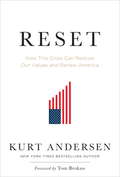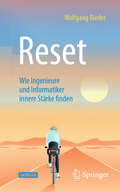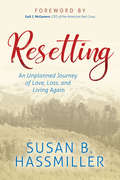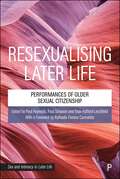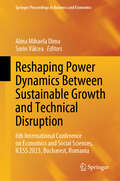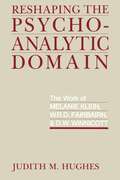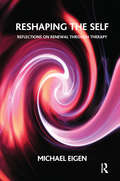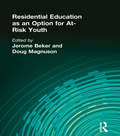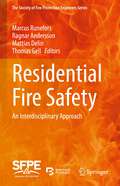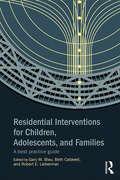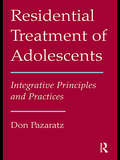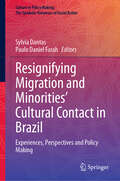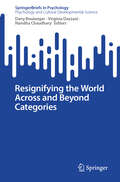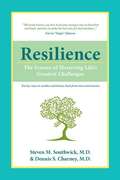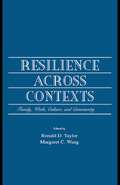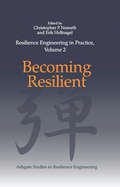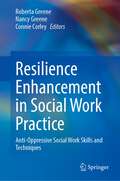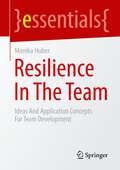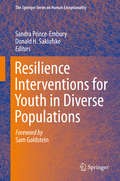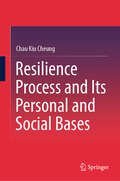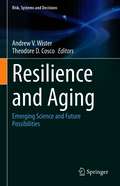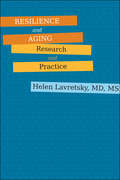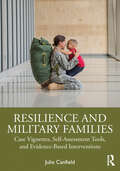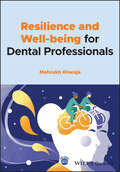- Table View
- List View
Reset: How This Crisis Can Restore Our Values and Renew America
by Kurt Andersen"This is the end of the world as we've known it," Kurt Andersen writes in Reset. "But it isn't the end of the world." In this smart and refreshingly hopeful book, Andersen--a brilliant analyst and synthesizer of historical and cultural trends, as well as a bestselling novelist and host of public radio's Studio 360--shows us why the current economic crisis is actually a moment of great opportunity to get ourselves and our nation back on track. Historically, America has always shifted between wild, exuberant speculation and steady, sober hard work, as well as back and forth between economic booms and busts, and between right and left politically. This is one of the rare moments when all these cycles shift dramatically and simultaneously--a moment when complacency ends, ossified structures loosen up, and enormous positive change is possible. The shock to the system can enable each of us to rethink certain habits and focus more on the things that make us authentically happy. The present flux can enable us as a society to consolidate the enormous gains of the last several decades in areas such as technology, crime prevention, women's and civil rights, and the democratization of the planet. We can reap the fruits of a revival of realism and pragmatism at home and abroad. As we enter a new era of post-party-line common sense, we can start to reinvent hopelessly broken systems-in health care, education, climate change, and more-and rediscover some of the old-fashioned American values of which we've lost sight. In Reset, Andersen explains how we've done it before and why we are about to do it again--and better than ever.
Reset: Wie Ingenieure und Informatiker innere Stärke finden
by Wolfgang RiederDas Buch behandelt die Balance zwischen beruflicher Leistung und persönlichem Wohlbefinden, speziell für Ingenieure, Techniker und IT-Profis. Es zeigt, wie man in einer zunehmend digitalisierten und stressigen Welt innere Stärke und Resilienz entwickeln kann. Das Buch richtet sich in erster Linie an Ingenieure, Techniker und IT-Profis, die sich in einer anspruchsvollen, leistungsorientierten Arbeitswelt befinden. Darüber hinaus eignet es sich für alle, die in technischen oder stressbelasteten Berufen arbeiten und nach Wegen suchen, Stress zu reduzieren, Resilienz aufzubauen und ein erfülltes Leben zu führen. Die fortschreitende Digitalisierung und Automatisierung prägen unsere Arbeitswelt wie nie zuvor. Ständige Erreichbarkeit, hohe Anforderungen und die zunehmende Angst vor Ersetzbarkeit durch KI und Maschinen machen das Thema aktueller denn je. Gleichzeitig wächst das Bewusstsein für mentale Gesundheit und persönliche Resilienz, insbesondere nach den Herausforderungen der letzten Jahre wie der Pandemie. Mein Buch greift diese gesellschaftlichen Veränderungen auf und bietet praktische Lösungsansätze, die direkt umsetzbar sind.
Resetting: An Unplanned Journey of Love, Loss, and Living Again
by Susan B. HassmillerResetting shares the story of a personal grief journey and helps transform today’s understanding of the human condition. Although grief and loss are universal human conditions around since the beginning of time, the idea of loss is still greatly feared, ignored, distained, undiscussed, and certainly not prepared for. It is no wonder people feel alone and isolated in their feelings and thoughts when loss comes to them. Longtime nurse, Susan Beth Hassmiller, who is no stranger to death, has experienced the journeys of suffering and death in her patients as well as her personal life in which she was completely blindsided by the physical, spiritual, and emotional toll.Resetting is written in a daily diary format in which Susan opens a very private window to the actual feelings and thoughts she experienced in the grief process. Resetting is raw and gripping as it illustrates a new level of understanding of the human condition. Susan helps those who have suffered loss gain a new perception and a greater sense of grief while learning lessons on how to help those suffering from grief—from words to say to tasks to take on.
Resexualising Later Life: Performances of Older Sexual Citizenship (Sex and Intimacy in Later Life)
by Paul Reynolds, Paul Simpson and Trish Hafford-LetchfieldBuilding on the work of the previous volumes in the Sex and Intimacy in Later Life series, this book explores how resexualisation may take place in later life. Drawing on transdisciplinary and international content, it provides a theoretically and experientially informed overview and discussion of resexualisation, highlighting important areas of research in a nascent area of study. This volume covers a range of sexual identities and ageing populations, blending cultural representations and current research to highlight the possible forms and practices that can lead to the creative enabling of pleasure.
Reshaping Power Dynamics Between Sustainable Growth and Technical Disruption: 6th International Conference on Economics and Social Sciences, ICESS 2023, Bucharest, Romania (Springer Proceedings in Business and Economics)
by Alina Mihaela Dima Sorin VâlceaThis book covers various topics related to economics and the social sciences, such as artificial intelligence, sustainability, ESG, and tax administration. The respective contributions provide insights and perspectives on the current challenges and opportunities in these fields, while also showcasing the latest research and innovations from scholars and practitioners around the world. The book is based on the papers presented at the 6th International Conference on Economics and Social Sciences, ICESS 2023, which was held in Bucharest, Romania.
Reshaping the Psychoanalytic Domain: The Work of Melanie Klein, W.R.D. Fairbairn, and D.W. Winnicott
by Judith M. HughesTracing the line of succession from Sigmund Freud, through Melanie Klein to Fairbairn and Winnicott, Judith Hughes demonstrates the internal development of the British school of psychoanalysis and the coherence of its legacy. Both lay reader and professional will find the book illuminating.
Reshaping the Self: Reflections on Renewal Through Therapy
by Michael EigenThe author relates the stories of two patients reshaping their lives into something they could believe in, and examines the complex roles of the therapist and therapy, self/other and mind/body relations, and the dramatic interplay of faith and catastrophe.
Residential Education as an Option for At-Risk Youth
by Jerome Beker Doug MagnusonResidential Education as an Option for At-Risk Youth explores recent residential programs in Israel, draws comparisons with their European counterparts, and recommends practical approaches for the revitalization of such programs in the United States. This volume refutes the conventional professional “wisdom” in the United States that residential group care programs for children and youth are intrinsically flawed and counterproductive. Instead, it delivers effective models for the implementation of effective residential services. The editors and authors demonstrate the growing need for residential programs, given the overburdened family foster care resources, swelling numbers of “zero-parent” families, and homeless youth. Though the United States helped launch and develop residential services in Europe in the aftermath of World War II and has produced many excellent thinkers in the domain of quality residential group care, American programs have languished in recent decades. This book is designed to accelerate and facilitate progress in revamping and establishing excellent residential group care. The authors examine residential education as a developmentally based alternative to the more clinically and correctionally oriented programs for marginal children and youth dominating this field in the United States.The authors present their material in the context of appropriate theoretical principles, yet in practical ways that will permit program developers and managers to implement it effectively. Some of the specific areas chapters discuss are: exemplary Israeli programs as observed by visiting American professional in social work and allied fields important program variables and the cultural influences that may affect them African American experience for such programs a conceptual model for building successful residential education programs key organizational and management considerationsResidential Education as an Option for At-Risk Youth serves as a vital resource for ambitious program developers and managers wishing to reconceptualize and enrich their programs. It will also benefit advanced students, practitioners, and decision makers who have had, heretofore, few resources to rely on when seeking to promote more effective programs for socially marginal children and youth.
Residential Fire Safety: An Interdisciplinary Approach (The Society of Fire Protection Engineers Series)
by Marcus Runefors Ragnar Andersson Mattias Delin Thomas GellThis book provides a comprehensive overview of deaths and injuries from residential fires as well as the most up to date information on evidence-based approaches to reduce this problem. The volume serves as a guide for professionals working in the field of fire prevention and as a textbook for instruction in universities and fire service schools. The authors’ interdisciplinary approach, where public health methodology is combined with fire protection engineering, medicine, and policy science, is quite distinctive outside of the technical literature devoted to larger scale fire events. Traditional textbooks on fire protection tend to describe the problem as purely technical, whereas in essence it is a problem of human vulnerability. In this book, readers will find lucid and rigorous descriptions of various risk groups and effective preventive measures that are effective, both in general and with respect to the different risk groups. They will also find work processes to facilitate risk reduction. Summarizing state-of-the-art knowledge and giving guidance for the future, both in terms of preventive efforts and ongoing research, Residential Fire Safety: An Interdisciplinary Approach, is ideal for students, educators, and practitioners of residential fire protection.
Residential Interventions for Children, Adolescents, and Families: A Best Practice Guide
by Gary M. Blau Beth Caldwell Robert E. LiebermanNow more than ever there is a need to ensure that best practices are being used in residential programs. As the focus on costs and outcomes increase, residential programs must clearly demonstrate that the interventions provided are efficient and effective. Readers will learn how to: Create strength-based, empowering and healing environments; Better engage and partner with children, adolescents and families, in meaningful ways; Support those who have experienced trauma and loss, and to prevent and eliminate the use of restraint and seclusion; Respect and include cultural indices in practices; Train, mentor, supervise, support and empower staff about how to deliver promising and best practices, and evidence-informed and evidence-based interventions; and Track long-term outcomes, and create funding strategies to better support sustained positive outcomes. This book encourages readers to think strategically about how agencies, communities and systems can identify and implement actions that lead to positive change and how to work more collaboratively to improve the lives of children and adolescents who have experienced emotional and behavioral life challenges and their families.
Residential Treatment of Adolescents: Integrative Principles and Practices
by Don PazaratzIn Residential Treatment of Adolescents, Pazaratz discusses how practitioners can remain emotionally available for the needs of their residents without feeling overwhelmed. Readers will be apprised of ways to deal judiciously with residents who try to circumvent, con, play workers off each other, and even attempt to seduce or manipulate the worker. Each chapter instructs readers to observe their clients and comprehend how they relate to the total environment, in order to determine what the resident is feeling and how he or she makes use of personal resources. This contextual understanding helps to answer questions such as: What are the youngster’s goals? What factors obstruct the change process? What are the youngster’s defenses and against what? How does the youngster use the milieu (staff and peers) and the community as resources? How can the youngster get significant others to react differently to him or her? Ultimately, Pazaratz demonstrates that effective treatment staff do not create dependent youth, make treatment oppressive, or enact a role based upon giving consequences. Instead, the reader will learn to integrate diverse intervention strategies into the resident’s normal cycle of daily life and how to interact within a team structure.
Resignifying Migration and Minorities' Cultural Contact in Brazil: Experiences, Perspectives and Policy Making (Culture in Policy Making: The Symbolic Universes of Social Action)
by Sylvia Dantas Paulo Daniel FarahThis volume provides in-depth discussions on the challenges of intercultural encounters in Brazil. It analyzes existing policies related to migration and minorities and proposes innovative approaches to policy-making. It also highlights policies that have had a real social impact. The volume consolidates theoretical contributions from authors of different but convergent fields to indicate the role of culture and cultural processes in a wide range of phenomena such as psychosocial intervention with immigrants, emigrants, returnees and refugees, homelessness, mental health and interculturality, mobility in urban settings, monolingualism and monocultural curriculum at Brazilian schools and universities, besides narratives of new and older immigrants. Displacement is one of the 21st century's greatest challenges, and this volume provides interdisciplinary perspectives on mobility and people in cultural contact in Brazil, the largest country in South America and the fifth most populous in the world. Although seen from a Brazilian scenario, issues discussed here permeate all other countries that are diverse and receive immigrants, and shed light on the complex socio-cultural world in which we live.
Resignifying the World Across and Beyond Categories (SpringerBriefs in Psychology)
by Nandita Chaudhary Virginia Dazzani Dany BoulangerThis book builds on the activities realized during the VI International Seminar of Cultural Psychology realized in May 2023 in Salvador de Bahia (Brazil), particularly a workshop forming a dialogical and open space of theoretical and methodological innovations. More specifically, researchers addressed meaning making processes that enable re-signifying reality across categories—dynamically shifting from one domain to another—and beyond them—developing synthesis and forming new ways of understanding and approaching cultural phenomenon. In this perspective the cultural processes that are discussed concern practical encounters –with people from different ages in different settings, particularly (but not exclusively) in the context of intervention— and pragmatic issues (how to approach people). In a neoliberal society in which language is used in its literal sense over its virtual meaning, categories tend to be reinforced in every iteration and potentially lead to segregation and exclusion as they are rendered invisible through interdiction of speaking (taboo) or framing social encounters with monological logic. In this book, the authors shed new light on categorization by re-signifying it in a dynamic fashion in relation to a variety of domains (gender, mental health, movement, aesthetics, poverty, are some examples). This book furnishes theoretical, methodological and practical tools that enable re-thinking about the process of recategorization. It has the potential to inspire the reframing of theory, research, as well as practices in psychology and other disciplines.
Resilience
by Dennis S. Charney Steven M. SouthwickMany of us will be struck by one or more major traumas sometime in our lives. Perhaps you have been a victim of sexual abuse, domestic violence or assault. Perhaps you were involved in a serious car accident. Perhaps you are a combat veteran. Maybe you were on the beach in Thailand during a tsunami, or in New Orleans during Hurricane Katrina. Or maybe, you are among the millions who have suffered a debilitating disease, lost a loved one or lost your job. This inspiring book identifies ten key ways to weather and bounce back from stress and trauma. Incorporating the latest scientific research and dozens of interviews with trauma survivors, it provides a practical guide to building emotional, mental and physical resilience. Written by experts in post-traumatic stress, this book provides a vital and successful roadmap for overcoming the adversities we all face at some point in our lives.
Resilience
by Dennis S. Charney Steven M. SouthwickHumans are remarkably resilient in the face of crises, traumas, disabilities, attachment losses and ongoing adversities. To date, most research in the field of traumatic stress has focused on neurobiological, psychological and social factors associated with trauma-related psychopathology and deficits in psychosocial functioning. Far less is known about resilience to stress and healthy adaptation to stress and trauma. This book brings together experts from a broad array of scientific fields whose research has focused on adaptive responses to stress. Each of the five sections in the book examines the relevant concepts, spanning from factors that contribute to and promote resilience, to populations and societal systems in which resilience is employed, to specific applications and contexts of resilience and interventions designed to better enhance resilience. This will be suitable for clinicians and researchers who are interested in resilience across the lifespan and in response to a wide variety of stressors.
Resilience Across Contexts: Family, Work, Culture, and Community
by Margaret C. Wang Ronald D. TaylorA number of societal risks pose serious challenges to families' well-being, many of which cut across divisions of class and race. These challenges include: changes in the labor market and economy; the increasing participation of mothers in the labor force; the changing nature of family structure and the composition of households; and the increase in the number of immigrant families. Key institutions in the lives of families, including places of employment and schools, can play a significant role in fostering families' capacity to adapt to the potential challenges they face. Resilience Across Contexts: Family, Work, Culture, and Community presents papers--written by leading scholars in varied disciplines including economics, developmental and educational psychology, education, and sociology--discussing factors that influence resilience development. The authors' research focuses on emerging issues that have significant implications for policy and practice in such areas as employment and new technologies; maternal employment and family development; family structure and family life; immigration, migration, acculturation, and education of children and youth; and social and human services delivery. The book's overall goal is to take stock of what is known from research and practice on some of the challenges facing children and families for policy development and improvement of practices.
Resilience Engineering in Practice, Volume 2: Becoming Resilient (Ashgate Studies in Resilience Engineering)
by Erik Hollnagel Christopher P. NemethThis is the fifth book published within the Ashgate Studies in Resilience Engineering series. The first volume introduced resilience engineering broadly. The second and third volumes established the research foundation for the real-world applications that then were described in the fourth volume: Resilience Engineering in Practice. The current volume continues this development by focusing on the role of resilience in the development of solutions. Since its inception, the development of resilience engineering as a concept and a field of practice has insisted on expanding the scope from a preoccupation with failure to include also the acceptable everyday functioning of a system or an organisation. The preoccupation with failures and adverse outcomes focuses on situations where something goes wrong and the tries to keep the number of such events and their (adverse) outcomes as low as possible. The aim of resilience engineering and of this volume is to describe how safety can change from being protective to become productive and increase the number of things that go right by improving the resilience of the system.
Resilience Enhancement in Social Work Practice: Anti-Oppressive Social Work Skills and Techniques
by Nancy Greene Roberta Greene Connie CorleyAs people around the globe experience more civil unrest and environmental disruption, the difficulties social workers face in their practice are becoming increasingly complex. This textbook deepens and expands the resilience-enhancing stress model (RESM) skill set and techniques so that social workers can more effectively serve clients and constituencies who are trying to overcome the stress of difficult life transitions and challenging environmental demands. It is designed as a companion piece to A Resilience-Enhancing Stress Model: A Social Work Multisystemic Practice Approach (Springer, 2022). The intent of the RESM is to further expand social workers' practice skill sets with additional concepts from the anti-oppressive practice (AOP) and coaching literature that aligns with the Educational Policy and Accreditation Standards from the Council on Social Work Education (CSWE). The book's 12 chapters are organized around life transitions and illustrate skills, techniques, and interviews important to the enhancement of resilience. Among the topics covered:The Resilience-Enhancing Stress Model: Articulating Anti-Oppressive PracticeExploring the Role of Cultural Diversity in Resilient Social Functioning: Theory and SkillsCountering Human Rights Violations During Life TransitionsFacilitating Community Development Following DisruptionResilience Enhancement in Social Work Practice: Anti-Oppressive Social Work Skills and Techniques uniquely offers practitioners a knowledge base to exponentiate their efficacy in identifying and fortifying resilience in a time in history when it appears to be imperative. It is written for a student social work audience at the generalist or advanced generalist level for practice across a range of populations and settings. It contains traditional and contemporary human behavior content that supports a social work narrative methodology and a life course perspective. It could be taught with its predecessor across one or two semesters. Practitioners in the field who are new to this content could also find the text a valuable resource.
Resilience In The Team: Ideas And Application Concepts For Team Development (essentials)
by Monika HuberThis essential provides insights into approaches, procedures and ideas on how resilience, understood as resistance, can be promoted and implemented in a team. Most of the time, these concepts are only applied to individuals. But many of the findings from resilience research can be transferred to teams and even extended. Today, resilience is also playing an increasingly important role in teams: whether it is to strengthen the sense of coherence according to Antonovsky's principle of salutogenesis, or to consider other resilience factors that support team capability
Resilience Interventions for Youth in Diverse Populations
by Donald H. Saklofske Sandra Prince-EmburyOur uncertain times are hard enough for adults to navigate. For all too many young people--even many who appear to possess good coping skills--the challenges may seem overwhelming. More and more, resilience stands as an integral component in prevention programs geared to children and adolescents, whether at risk or not. Resilience Interventions for Youth in Diverse Populations details successful programs used with children and teens in a wide range of circumstances and conditions, both clinical and non-clinical. New strength-based models clarify the core aspects of resilience and translate them into positive social, health, educational, and emotional outcomes. Program descriptions and case examples cover diverse groups from homeless preschoolers to transgender youth to children with autism spectrum disorders, while interventions are carried out in settings as varied as the classroom and the clinic, the parent group and the playground. This unique collection of studies moves the field toward more consistent and developmentally appropriate application of the science of resilience building. Among the empirically supported programs featured: Promoting resilience in the foster care system. Developing social competence through a resilience model. Building resilience in young children the Sesame Street way. School-based intervention for resilience in ADHD. Girls Leading Outward: promoting resilience in at-risk middle school girls. Resiliency in youth who have been exposed to violence. Resilience Interventions for Youth in Diverse Populations is an essential resource for researchers, professionals/practitioners, and graduate students in clinical child and school psychology, social work, educational psychology, child and adolescent psychiatry, developmental psychology, and pediatrics.
Resilience Process and Its Personal and Social Bases
by Chau Kiu CheungThis book is to elucidate personal and social bases for personal resilience, thus addressing the issue concerning the predominance of social factors in shaping resilience. Essentially, the book starts with a clarification of resilience as a phenomenon rather than a trait. The clarification also identifies the personal bases in terms of the resilience process, which specifies belief about resilience as a precursor to learning about resilience, action for resilience, and resilience successively. To justify the personal and social bases, the book expounds the analytical-functionalist framework to specify voluntaristic and deterministic mechanisms to perform the four requisite functions of goal attainment, adaptation, integration, and latency. Equipped with the conceptual and theoretical grounds, the book proceeds to scrutinize the effects of personal and social factors on resilience and its process. The personal factors include personal background characteristics, personality, functional disability, and various beliefs, whereas the social factors include experiences of caring, peace, violence, and social exclusion in society, kindness, sociability, and aid from other people, and social capital. The scrutiny engages five databases about 6.948 Chinese people in Hong Kong and neighboring Chinese cities, composed of the public, service users, older adults, students, and people with visual impairment. Overall, the book presents ample theoretical and empirical substances to clarify the genesis of resilience.
Resilience and Aging: Emerging Science and Future Possibilities (Risk, Systems and Decisions)
by Andrew V. Wister Theodore D. CoscoOlder aged adults face many adversities over the later life course. This edited volume will address the ways in which seniors bounce back from different types and combinations of adversity – termed “resilience”. While research has been accumulating that identifies inherent abilities and external resources needed to adapt and navigate stress-inducing experiences among aging and older adults, gaps remain in understanding the unique elements and processes of resilience. A series of chapters included in this book will address several overarching questions: why do some older individuals/families/communities adapt to adversity better than others; what are modifiable behavioral protective/risk factors related to resilience; and how can we foster resilience at the individual/community level and which approaches show the most promise?The spectrum of aging-related challenges and responses addressed in this book include: mental health; physical/functional health problems; multimorbidity; socio-economic deprivation; social isolation and loneliness; cultural dimensions of loneliness; housing/homelessness problems; and environmental disasters. This book presents cutting-edge science at the conceptual, methodological, empirical and practice levels applied to emerging resilience sub-fields in gerontology. It will also present potential areas of future research, policy and practice linked to these areas.During a period of the most rapid population aging in the US, Canada and many other nations, coupled with heightened global socio-political change, extending our knowledge of resilience will help society to make important adjustments to maximize health and wellness of older individuals. Supporting and enhancing resilience through technological, social and/or community-level advances in geroscience will help those facing adversity to thrive by harnessing, stretching, and leveraging a wide array of potential resources. The promotion of healthier older populations has far-reaching consequences for health care and social/community support systems, both in terms of public health including pandemic response, and the development and implementation of innovations in treatment and practice guidelines.
Resilience and Aging: Research and Practice
by Helen LavretskyResilience is a key component in maintaining health and happiness in old age.When aging adults struggle with social isolation, financial instability, or the difficult work of caring for a spouse with a chronic illness, their levels of stress can be enormous. But many older adults are living longer and are trying to make the best of their later years despite being more vulnerable to stress. In Resilience and Aging, renowned geriatric psychiatrist Dr. Helen Lavretsky explains how enhanced resilience—which involves positively adapting to adversity in a way that maintains a person’s biological and psychological equilibrium—can counter that vulnerability. She describes how care, practice, and research all can be redirected toward emphasizing the positive aspects of aging and prevention.Lavretsky summarizes the most up-to-date research on resilience, neurobiology, and preventive care. She also describes novel interventions—including yoga, tai chi, meditation, and allopathic techniques—that can help older adults improve their cognition and quality of life. Finally, she explores relevant clinical cases from her practice. Designed for geriatric practitioners, researchers, and family caregivers, this practical book offers critical information on measuring resilience, the role of spirituality in reducing stress, and incorporating resilience-building procedures into clinical practice or everyday life. Throughout, the book’s revolutionary integrative approach aims to amplify personal happiness by allowing aging adults to remain healthy and active while simultaneously reducing the cost of chronic disease to families and society.
Resilience and Military Families: Case Vignettes, Self-Assessment Tools, and Evidence-Based Interventions
by Julie CanfieldThis textbook aims to educate students across all mental health disciplines on the importance of using strengths-based resilience as a tool when working with military families. Organized into three main sections using the military deployment cycle, including the stages of pre-deployment, deployment, and post-deployment, this textbook examines some of the key resiliency skills that operate in military families so that students can understand how many families not only survive, but learn how to thrive, during great challenges. Chapters address the military at home, resilient family systems, the importance of effective communication and social support, the impact of trauma and moral injury, and the transition from military to civilian life following service. Filled with case vignettes, self-assessment tools, and evidence-informed interventions, readers learn multiple ways to measure, assess, and strengthen family resiliency throughout the book. In addition to these skills, specific examples are highlighted that draw lessons from the military community on stress management and posttraumatic growth in the context of family life. The book finishes with an appendix that includes suggestions for therapists on the use of cultural humility to improve treatment.Following two decades of war and a global pandemic, this essential textbook is a crucial read for all mental health professionals training to work with miliary-connected populations and their families. Professionals from disciplines including clinical social work, marriage and family therapy, psychology, healthcare, and theology as well as instructors of courses on military social work, military psychology, and mental health will all find this text an invaluable resource.
Resilience and Well-being for Dental Professionals
by Mahrukh KhwajaResilience and Well-being for Dental Professionals Essential reading for dental professionals and other healthcare workers wanting to build emotional resilience and positive mental health Dentistry is a high-stress profession with elevated rates of anxiety, depression, burnout, suicidal thoughts and self-harm. Chronic workplace stress is a growing concern as it can severely damage the mental health of dental professionals and negatively impact their ability to provide appropriate care. Psychological interventions have been shown to greatly benefit the well-being and emotional resilience of the medical and healthcare community, yet resources that provide preventative tools are limited. Resilience and Well-being for Dental Professionals, is designed not only to combat occupational hazards in Dentistry, such as burnout and compassion fatigue, but also to build resilience, engagement at work and nurture positive mental health through a variety of evidence-based tools. This invaluable guide helps readers utilise tools from the science of well-being (Positive Psychology, Mindfulness, Cognitive Behavioural Therapy and Acceptance and Commitment Therapy), to create happier, thriving careers. It includes: Tools from resilience interventions to help dental professionals implement preventative habits and take steps towards positive mental health Focus on self awareness in recognizing burnout early Positive psychology and well-being exercises, customised for dental professionals, to help you meld together research and application: from journaling and creative exercises to nature-based and activities at work Measure and track well-being using psychological scales Manage difficult emotions, practice mindfulness and self-compassion, develop a culture of kindness and gratitude at work, utilise a growth mindset when upskilling, harness positive leadership and use strengths, with patients and at home Create habits that stick through applying the psychology of goal setting, behaviour change, motivation psychology, work-life harmony and happiness Written by a Positive Psychologist, and Dentist, with more than 12 years’ clinical dentistry experience within a stressful NHS environment, Resilience and Well-being for Dental Professionals is a must-have resource for all dental students, hygienists, therapists, dentists, dental nurses, dental technicians, specialists and allied healthcare workers.
